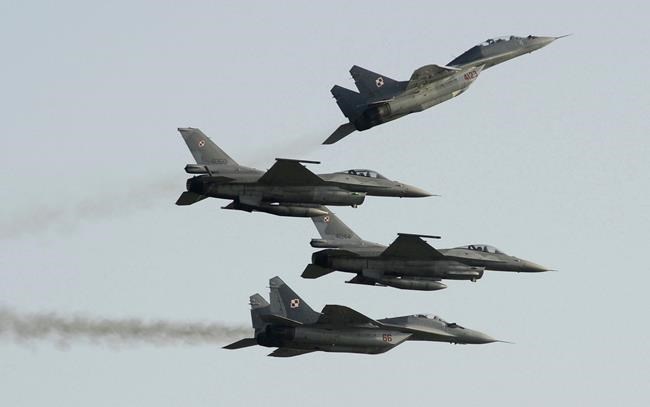Pentagon rejects NATO nations providing jets to Ukraine
Advertisement
Read this article for free:
or
Already have an account? Log in here »
To continue reading, please subscribe:
Monthly Digital Subscription
$0 for the first 4 weeks*
- Enjoy unlimited reading on winnipegfreepress.com
- Read the E-Edition, our digital replica newspaper
- Access News Break, our award-winning app
- Play interactive puzzles
*No charge for 4 weeks then price increases to the regular rate of $19.00 plus GST every four weeks. Offer available to new and qualified returning subscribers only. Cancel any time.
Monthly Digital Subscription
$4.75/week*
- Enjoy unlimited reading on winnipegfreepress.com
- Read the E-Edition, our digital replica newspaper
- Access News Break, our award-winning app
- Play interactive puzzles
*Billed as $19 plus GST every four weeks. Cancel any time.
To continue reading, please subscribe:
Add Free Press access to your Brandon Sun subscription for only an additional
$1 for the first 4 weeks*
*Your next subscription payment will increase by $1.00 and you will be charged $16.99 plus GST for four weeks. After four weeks, your payment will increase to $23.99 plus GST every four weeks.
Read unlimited articles for free today:
or
Already have an account? Log in here »
Hey there, time traveller!
This article was published 09/03/2022 (1371 days ago), so information in it may no longer be current.
WARSAW, Poland (AP) — The Pentagon on Wednesday slammed the door on any plans to provide MiG fighter jets to Ukraine, even through a second country, calling it a “high-risk” venture that would not significantly change the effectiveness of the Ukrainian Air Force.
Pentagon press secretary John Kirby told reporters that Defense Secretary Lloyd Austin spoke with his Polish counterpart on Wednesday and told him the U.S. assessment. He said the U.S. is pursuing other options that would provide more critical military needs to Ukraine such as air defense and anti-armor weapons systems.
Poland had said it was prepared to hand over MiG-29 planes to NATO that could then be delivered to Ukraine, but Kirby said U.S. intelligence concluded that it could be considered escalatory and trigger a “significant” Russian reaction.

Kirby’s remarks went beyond his comments in a statement Tuesday, rejecting Poland’s offer to give fighter jets to the United States for transfer to Ukraine.
He said individual NATO nations can make up their own minds on what assistance to give Ukraine, but it’s questionable whether any would provide fighters without U.S. support.
THIS IS A BREAKING NEWS UPDATE. AP’s earlier story follows below.
WARSAW, Poland (AP) — An awkward dispute between the United States and NATO ally Poland is casting doubt on Ukraine’s hopes to obtain the MiG fighter jets it says it needs to defend against Russia’s invasion.
No one wants to stand out alone behind the action, which could invite Russian retaliation.
The U.S. government threw Poland a hot potato with a request to send Soviet-made fighter jets — which Ukrainian pilots are trained to fly — to Ukraine. Poland threw it right back, saying it was prepared to hand over all 28 of its MiG-29 planes — but to NATO by flying them to the U.S. base in Ramstein, Germany.
That plan took the U.S. off guard. By late Tuesday, the Pentagon rejected it as “untenable.” On Wednesday, Secretary of State Antony Blinken said that ultimately each country would have to decide for itself. In diplospeak: “Poland’s proposal shows there are complexities that the issue presents when it comes to providing security assistance.”
Will Ukraine get the planes? Vice President Kamala Harris was arriving in Warsaw late Wednesday, though the White House said she would not be negotiating the planes issue. Blinken said the U.S. was consulting with Poland and other NATO allies. Pentagon chief Lloyd Austin and Joint Chiefs Chairman Gen. Mark Milley were also consulting with their Polish counterparts, the White House said.
In the scenario Poland proposed, it would be up to the entire NATO alliance, which makes its decisions unanimously, to decide.
Poland is already taking in more people fleeing the war in Ukraine than any other nation in the midst of the largest refugee crisis in decades.
It has suffered invasions and occupations by Russia for centuries, and still fears Russia despite being a member of NATO. It already had to contend with the Russian territory of Kaliningrad on its northeastern border and is uncomfortably aware of Russian troops across another border, with Belarus.
In a visit Wednesday to Vienna, Polish Prime Minister Mateusz Morawiecki insisted that Poland is a not a party to the Ukraine war and that any decision on whether to send the fighter jets could not be one for Warsaw alone.

It carries the risk of “very dramatic scenarios, even worse than those we are dealing with today,” Morawiecki argued.
Though big and strong, NATO, too, is deeply concerned about any act that might drag its 30 member countries into a wider war with a nuclear armed Russia. Under NATO’s collective security guarantee, an attack on one member must be considered an attack on all. It’s the main reason that Ukraine’s appeals for a no-fly zone have gone unanswered. Ukraine is not a NATO member.
NATO Secretary-General Jens Stoltenberg on Wednesday again praised the bravery of the Ukrainian people and armed forces in the face of an assault by a much bigger adversary but underlined that the world’s largest security organization must stand by its “painful decision” not to police the skies over the country.
Days earlier U.S. Secretary Blinken said Washington had given a “green light” to the idea of supplying Ukraine with fighter jets and was looking at a proposal under which Poland would supply Kyiv with the Soviet-era fighters and in turn receive American F-16s to make up for the loss.
Michal Baranowski, director of the Warsaw office of the German Marshall Fund think tank, told The Associated Press the Warsaw government “was blindsided and surprised” by Blinken’s public request.
“This was seen as pressure from the U.S. on Warsaw. And therefore the reaction was to put the ball back in the U.S. government’s court,” Baranowski said in an interview.
It all “should have been dealt with behind the scenes,” he said.
___
Eric Tucker in Washington and Lorne Cook in Brussels contributed.


